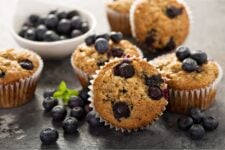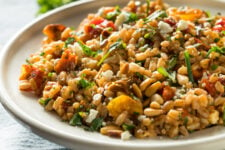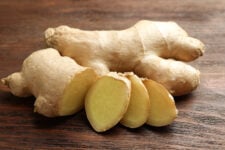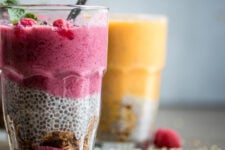Historically eaten for fuel by Aztec warriors, chia seeds have gained popularity in recent years as a superfood with numerous health benefits.
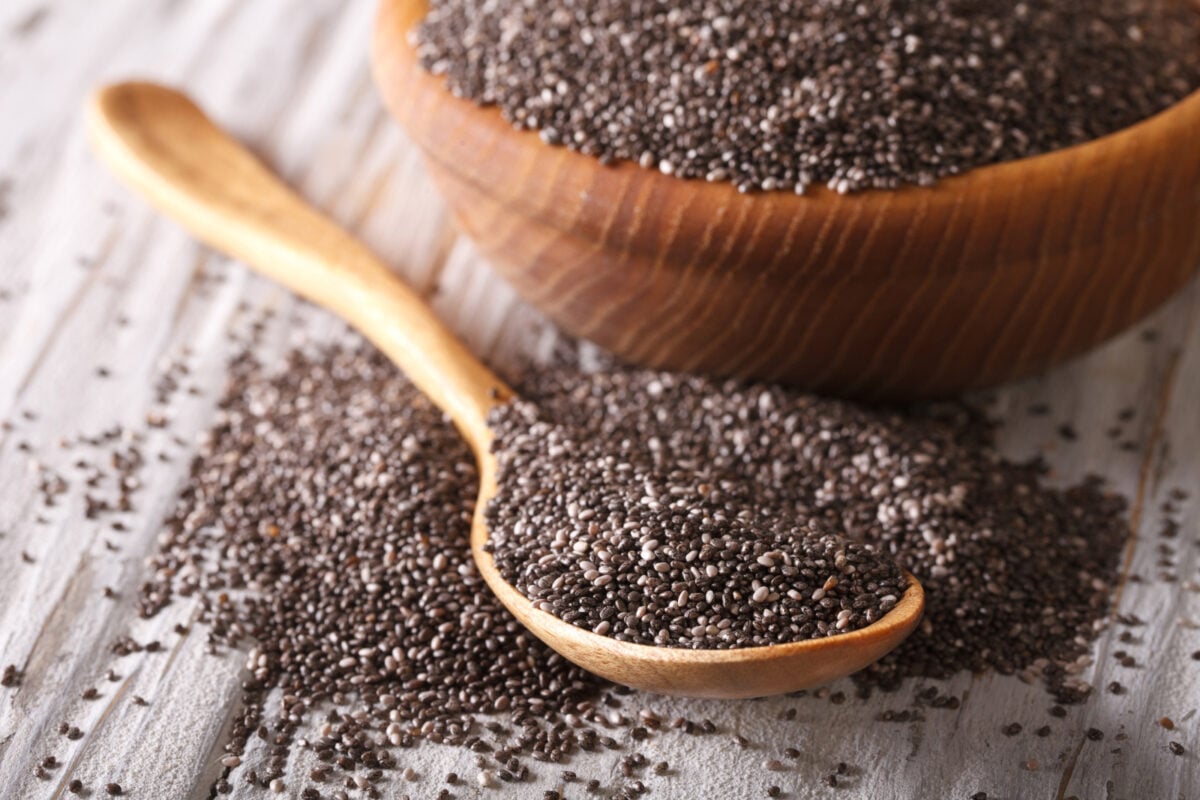
These tiny, gray seeds come from the plant Salvia hispanica, native to Mexico and Guatemala. Chia seeds add a unique texture to various dishes, from thickening pudding to replacing eggs in baked goods.
Recent studies have found that chia seeds can help improve cholesterol, lower blood pressure, and manage blood sugar levels. Chia seeds also have antimicrobial properties and can boost your immune system (1).
Continue reading to learn more about the nutritional profile and health benefits of chia seeds.
Nutritional Profile of Chia Seeds
Chia seeds are a nutrient-dense food, meaning they contain high amounts of vitamins and minerals in a small portion. They are a good source of vitamin E, iron, magnesium, calcium, B vitamins, and omega-3 fatty acids (1).
Chia seeds are incredibly rich in fiber and are an excellent way to get some plant-based protein in your diet. Just one ounce (or two tablespoons) of chia seeds contains (2):
- 138 calories.
- 4.7 g protein.
- 8.7 g fat.
- 12 g carbohydrates.
- 9.8 g fiber.
Additionally, chia seeds are rich in antioxidants, which are beneficial plant compounds that slow down damaging oxidation in the body. Their antioxidant and omega-3 fatty acid content provide anti-inflammatory and immune-boosting benefits (1).
Health Benefits of Chia Seeds
Research shows that chia seeds can provide numerous health benefits when eaten regularly due to their rich fiber, plant protein, and omega-3 fatty acid content.
Heart Health and Cholesterol Management
Chia seeds may reduce the risk of developing heart disease because they are rich in antioxidants and omega-3 fatty acids. Chia seeds primarily contain soluble fiber, which is a type of fiber associated with improved cardiovascular health (1).
Over time, eating chia seeds can boost your heart health by reducing triglycerides, improving HDL (good) cholesterol levels, and lowering blood pressure (1).
Improved Digestion and Gut Health
Including chia seeds in your diet may support a healthy digestive system and gut microbiome. The rich fiber content of chia seeds makes them a beneficial option for managing constipation (1).
However, talk to your doctor before significantly increasing your fiber intake, as some medical conditions require a lower fiber diet.
Blood Sugar Regulation and Diabetes Management
Research shows that a high-fiber diet can reduce the risk of type 2 diabetes and help regulate blood sugar levels in those with diabetes. This is because fiber slows down digestion, minimizing dramatic blood sugar spikes after eating (3).
Because chia seeds are an excellent source of fiber, many people find them to be an easy way to meet their fiber goals and help keep blood sugar levels in check.
Weight Management and Satiety
Adding chia seeds to your diet may help regulate appetite. One study found that eating a mid-morning snack containing chia seeds increased satiety and lowered hunger levels (3).
The study participants consumed 25% fewer calories at lunch on the days they had the chia seed snack.
However, research on the effectiveness of chia seeds for weight management is mixed, with some studies showing significant weight loss and others finding no difference in body weight (3).
Boosted Energy and Endurance
Historical records show that ancient Aztec warriors heavily relied on chia seeds to provide them with energy and endurance during battles.
Though modern research is needed to support this claim, one small study from 2011 found that endurance athletes who consumed chia seeds performed just as well as those who carb-loaded before a race (4).
How To Incorporate Chia Seeds Into Your Diet
If you’re new to chia seeds, it’s important to know that they can absorb liquid, which softens the seeds and creates a gel-like consistency. This makes them a vegan staple for many culinary applications.
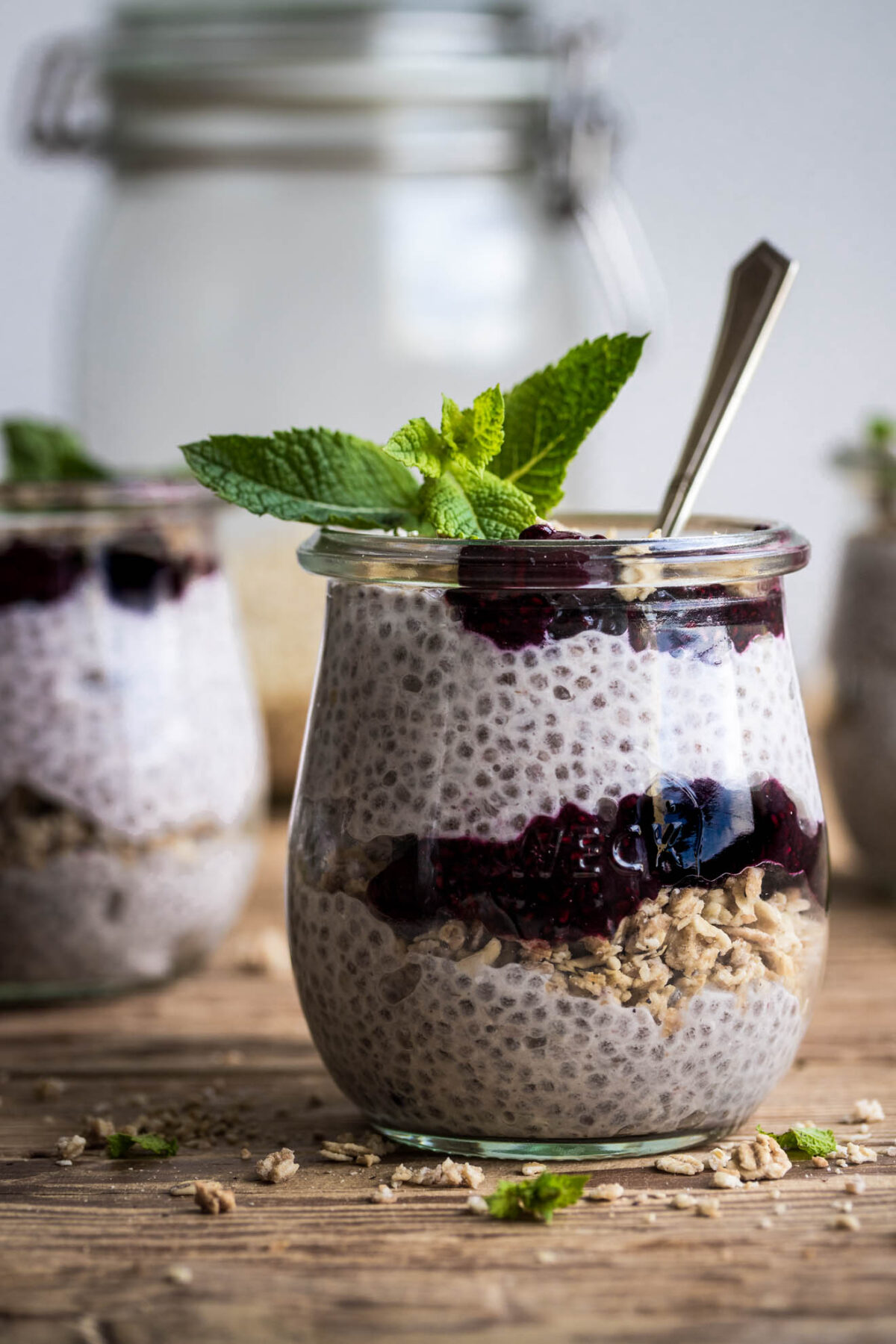
Chia Seed Pudding Recipes
Because of how chia seeds thicken when mixed with liquid, they can be used as the primary ingredient in vegan pudding. Simply soak chia seeds in plant-based milk until thick and flavor with ingredients like vanilla, maple syrup, cinnamon, and fresh fruit.
If you dislike the lumpy texture of chia pudding, try blending the chia seeds and milk before soaking for a smoother pudding.
Try our favorite chia pudding recipes here:
Chia Seed Smoothie Ideas
Chia seeds add a nutrient boost to any smoothie without altering the flavor. Either blend with your smoothie or sprinkle on top of a smoothie bowl for an added crunch.
Baking With Chia Seeds
Chia seeds make an excellent vegan egg substitute in baked goods. Simply mix one tablespoon of chia seeds with three tablespoons of warm water and let it sit for a few minutes until the chia seeds gel up. This is equivalent to one egg.
This method works best as a binder in baked goods, like banana bread or muffins. Ground flax seeds also work as an alternative to chia seeds in the above egg replacer recipe.
Potential Side Effects and Precautions
Though chia seeds are generally safe to consume, there are a few considerations to be mindful of when adding them to your diet.
Use Caution With Dry Chia Seeds
Because chia seeds expand in water, it’s best to eat them mixed with foods that have some moisture, such as a smoothie, yogurt, or oatmeal. In extreme cases, eating dry chia seeds on their own can cause a blockage or become a choking hazard (5).
Digestive Issues
Though the fiber content of chia seeds provides many health benefits, specific populations should be cautious about increasing fiber.
For example, people with digestive conditions that cause inflammation in the gut, like Crohn’s disease, may need to limit their fiber intake depending on their symptoms (6).
In general, eating too much fiber can cause digestive upset, including gas, bloating, and nausea (7). If you want to add chia seeds to your diet, start slowly and prioritize your hydration.
As always, talk to your doctor before making any major dietary changes.


